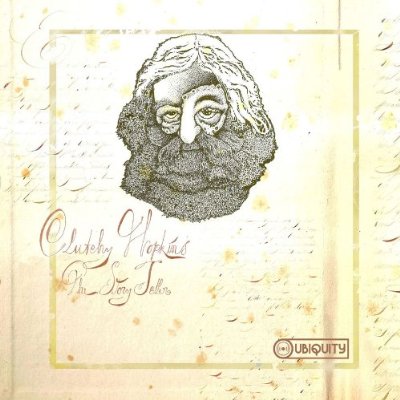Home » Jazz Articles » From the Inside Out » Sing it Out to Swing it Out!
Sing it Out to Swing it Out!
 Joe Cuba
Joe Cuba A Man & His Music—El Alcalde del Barrio
Fania Records
2010
Exhaustive and exhausting (because you won't be able to stop dancing), A Man & His Music—El Alcalde del Barrio presents the first major retrospective of the 240 albums recorded by Joe Cuba, the Father of Latin boogaloo, and was released in February 2010 to commemorate the one year anniversary of his passing.
Gilberto Navarro was born in early 1930s Spanish Harlem. Inspired by the storied Latin percussionist Sabu, he taught himself to jam on congas and eventually wound up in the neighborhoods' legendary Latin ensemble La Alfarona X. A promoter gave Navarro his "Joe Cuba" stage name; his body of work and the adoration of Latin and dance music fans for that work gave him his nickname, "The Mayor of the Barrio" (El Alcalde del Barrio).
Cuba's lyrics and music deftly and synergistically create the ultimate boogaloo party, and you'll discover way too much fun dancing among these 34 tracks to fully detail. The first track on this compilation asks "Do You Feel It?" and the subsequent music answers with such potent, powerful Latin and Latin boogaloo grooves that you can't help but feel it! Different sections of a very large group—including, from its sound, little children—shout out the "Bang bang" and "Beep beep" lyrics to "Bang Bang," and as dumb as that may read on paper, it sounds brilliant in your ears: "Bang Bang" was one of if not the very first Latin singles to pass one million sales. Those ears won't be able to tell where the piano ends and the vibes begin, and where the vibes end and the percussion begins, in "El Pito (I'll Never Go Back to Georgia)." It all sort of melts together into a musical stream, and sparkles beneath a magical, glorious Latin sun.
"La Calle Esta Durisima" shines no less brilliant, especially when Tommy Berrios' vibes bounce Caribbean beats off its wall of Afro-Cuban percussion, and Berrios' solo to close "Y Joe Cuba Ya Llego" dances like Snoopy rocking his doghouse top.
To be honest, I wish I could share more about other tunes, such as "Macorina," for which I have very few useable notes because, by that time, I just had to get up and dance. Even so, A Man & His Music reveals a truth that Spanish Harlem has known for decades: Joe Cuba led some hellacious Latin boogaloo bands, was himself a ferocious entertainer, and it seems completely impossible to listen to his music without wanting to dance or at least smile—wildly.
 Clutchy Hopkins
Clutchy Hopkins The Story Teller
Ubiquity Records
2010
Clutchy Hopkins is one of the most inscrutable musical characters you'll ever meet, if you could meet him. No one seems to know who he is, including and especially his record label, or even if Clutchy Hopkins is a singular him or a collective them. Complicating the matter, The Story Teller has vocals but not one single lyric. So how does this person who may not even be a person use no words to tell a story?
The same way that a haiku can tell a story: by connecting threads of barely sketched yet evocative pictures that create, reflect and repeat quick scenes of mood and thought, and then dissolve like mist. The Story Teller loosely connects a series of thoroughly minimalist sound portraits, without one instrumental or vocal solo.
"Miles Chillin'" builds up from what almost sounds like spare piano, electric guitar and African percussion parts, in a production that gives just as much importance to these instruments as to the space around and between them. So does the spaced-out, frozen chill of "Drunk Socks," which rocks off its hypnotic bass line. "No Contact...Contact" conjures a deeper, more psychedelic mood: a soft vocal chant drones in harmony with acoustic guitar while an electric guitar from the 1960s dances with hip-hop drums from the 1990s, and flute floats in and out like a curious, fluttering butterfly.
Our protagonist(s)—whoever he is / whoever they are—roll up to "Truth Seekin'" in a jitterbugging jalopy, blasting out clunky little horns that sing along with its engine, cruising in low fidelity on soft and warm funky drums that sound like brushes on cardboard. This set's minimalist facade crumbles just once, to reveal a happily busy percussion break in "Thinkin' of Eva."
The Story Teller doesn't give you an awful lot to go on and seems to leave most of the story blank, for you to fill in for yourself.
 Janiva Magness
Janiva Magness The Devil is an Angel Too
Alligator Records
2010
Just one listen to The Devil is an Angel Too, Janiva Magness' ninth album and second for Chicago's venerated blues label Alligator, immediately reveals why she's the Blues Music Awards' reigning "Contemporary Blues Female Artist of the Year" and "B.B. King Entertainer of the Year" (only the second female to cop the "Entertainer" honor—Koko Taylor was the first).
For sure, Magness knows about the blues. Once a foster child deemed "at risk," Magness' musical talents illuminated her life's path; she dedicates this release "to all Foster Youth and Alumni" and her liner notes include links to several online organizations devoted to this same cause. She's also serving for her fourth consecutive year as national spokesperson for Casey Family Programs, which promotes National Foster Care Month.
Fronting a band co-led by multi-instrumentalists David Darling (founder and leader of the Boxing Ghandis) and her husband Jeff Turmes, Magness' cyclone of a voice sometimes seems to echo Janis Joplin's vocal ghost, swinging all the way from her heels to belt out the country-fried "Walkin' in the Sun," and twirling like a banshee through this gritty, lowdown title track.
Magness (or somebody) sure knows how to pick her cover versions. They re-craft and re-energize "I'm Gonna Tear Your Playhouse Down," popularized by Graham Parker during his prime with The Rumour, into a contemporary blues, guitars sawing into the melody and drums hammering the pieces back together, and the throaty edge to her voice steeped in back-road whiskey and country tobacco, husky whispers of Janis's wild-child wailing.
She also slow grinds "I Want to Do Everything For You" (by Joe Tex) into a sexy and swivel-hipped blues, then snarls and moans the woman left behind blues in "Homewrecker" from the witheringly acid pen of Nick Lowe, a steamrolling arrangement which Magness' band absolutely flattens.
In the context of Magness' upbringing and this album's dedication, lines such as "It's a new life for me" help this slow-burning version of "I'm Feelin' Good" resonate with deep emotional power.
 Francis Albert Sinatra/Antonio Carlos Jobim
Francis Albert Sinatra/Antonio Carlos Jobim The Complete Reprise Recordings
Concord Records
2010
Finally.
The Complete Reprise Recordings compiles every tune—all 20—that America's supreme vocalist recorded with Brazil's preeminent composer during their legendary late 1960s summits. The first ten comprise the famous, fantastic Francis Albert Sinatra / Antonio Carlos Jobim album arranged and orchestrated by Claus Ogerman, released by Reprise in 1967. Sinatra and Jobim reconvened two years later, with Eumir Deodato replacing Ogerman as arranger, to record 10 more tunes for a second Sinatra-Jobim album that the Chairman withdrew from the market as soon as it was shipped (we'll explain why). Seven of those tunes later appeared as the first side of Sinatra & Company, released by Reprise in 1971; this new compilation unveils the other three—"Bonita," "Desafinado (Off Key)" and "The Song of the Sabia"—for the first time.
Few moments in music are more beautiful and magical than the softly strummed guitar, sighing horns and whispered drums that introduce you to "The Girl From Ipanema," and "Change Partners" stands among Sinatra's best Irving Berlin interpretations. But unless you've experienced the magic and wonder of that first Sinatra/Jobim release, it is almost impossible to explain in words how beautifully its music floats and sways. Since many such words have already been written, we can concentrate on the newly released music instead.
Deodato contributes several fantastic arrangements. He mixes the principals' wordless vocals into the rhythm track of "Drinking Water (Agua de Beber)," bouncing them across the stereo channels, and also serves up the funkiest half-gospel, half-Brazilian piano with which Sinatra ever recorded. Deodato casts Sinatra's voice upon a simply perfect "Wave," with calling acoustic guitars and strings, answering flutes, and Sinatra snuggling down deep in his register with supreme control (and even some extracurricular funky bass/drum "four" play in the fade). Jobim, Deodato and Sinatra vocally and instrumentally illuminate "Someone to Light Up My Life" into a polished, golden glow. That one really should have been a hit.
Hindsight confirms Sinatra's instinct to withdraw that second album with Jobim because of its take on "Desifinado (Off Key)," in which Jobim's wavering vocal finds but too rarely holds its mark. Even so, this set's conclusion, "Bonita," captures a truly magical moment when the instruments and beat completely drop out and the only thing left to carry its melody is Sinatra's strong and sure voice, followed and traced by strings in a mysterious romantic shadow. Magic that was worth waiting for. Magic that now is here. Finally.
 Carmen Souza
Carmen Souza Protegid
Galileo Music
2010
One often hears the expression, "It's all over the map." But it's rarely used been more truthfully or appropriately than when applied to Protegid, the third album by vocalist Carmen Souza, born in Lisbon, of Cape Verdean descent, and now residing in London. Singing in a colorful, eclectic Portuguese-based Creole, Souza illuminates, stretches, and snaps back the elastic connections between Latin, African and Arabic music, American jazz and the music of Cape Verde.
Souza conclusively proves that the "world music" evolution/revolution has transformed modern vocal as well as instrumental music. This transformative power breathes new life into the most famous song written by Cape Verdes' most famous native musician, "Song for My Father" by Horace Silver. Her new "Song"—more than mere rearrangement—tosses together a Latin shuffle from piano and percussion that keeps the original's rhythm rocking, with her vocal softly tracing the padded steps of her electric keyboard solo. "I came to discover that the songs that people sang in the fields on Cape Verde have the same pentatonic scale identified with the blues," she marvels.
Souza's half-spoken, half-sung introduction, and subsequent verses, to "Dos Eternidade (Two Eternities)" suggest Nina Simone pattering in French surrounded by a carnival of steel drums, a scene that abruptly shifts into jazz piano backed by percolating congas, jingling bells, and whistles. "Tente Midj" jumps out of this production, stewing percussion, acoustic guitar, and vocals together with jackrabbit accordion until thoroughly blended and steaming hot. The piano chords and horn chart of "Kem e Bo (Who Are You)" turn toward yet another time and place, the studied jazz-pop cool of Steely Dan. Unified with fretless bass, piano and percussion, her closing vocal to "Magia ca tem (Passionless)" even seems to whisper the same rarified breath as Flora Purim from Purim's magical tenure in Return to Forever.
"Afri Ka" and "D'xam ess moment (Worthwhile)" erupt with the wondrously inexplicable joy of vibrant, sunny African rhythms, teased and played out by Souza's vocal, sighing and flying, mewing and cooing, and very much sounding like a prowling cat.
 Tomisheep
Tomisheep Rhodes Trip
Air MS Media
2010
Tamas Barany studied for eight years at the Bela Bartok Music Academy in his native Hungary and in 2004 was appointed a Knight in the Order of Saint George (Eastern Europe's oldest chivalric order, established in 1326), an appointment he accepted as a pianist, accompanied by an oath to protect the origins of traditional Hungarian music.
Barany relocated to Montreal as a composer, arranger and keyboardist for hire, session work that seemed to satisfy more professional needs than creative ones. "After scoring the music for 26 episodes of a TV series, I needed to get away from the computer and back to the basics, to free form, and record with great musicians," he says. "I polished up my trusted Fender Rhodes, and contacted my friend Alex Bellegarde, a crazy doublebass player and improviser."
On Rhodes Trip, his debut under his performing name Tomisheep, the keyboardist and composer finally gets his chance to flip his lid and rock the house. Its liner notes say that "This album puts the fun back into the word jazz," a promise delivered by the music within. Led by fluttering flute and a bass line big and fat enough to choke an elephant, "NCRDBLS" cuts an enormous, smooth-flowing jazz funk groove that offers neither preview nor clue to its hard-hitting, culminating eruption of rock 'n' roll guitars and drums.
Rhodes Trip takes a Latin turn with "Jules Bond," where Tomisheep's keyboard cooly muses on the hot coals of burning timbales and other percussion; "Jules" segues into "Cubaq," an incredibly intense and lively companion Latin bonfire respectively stoked by Eduardo Sanchez's incandescent trumpet and Richard Lemoine's flamethrower electric guitar.
If I could write music instead of review it, a tune like Tomisheep's opener—titled "Finally," as if its arrival took a lifetime—would be the first song I'd write: an abundant buffet sumptuous with itchy rhythm guitar, scratchy turntables, floating flute, and the beating pulse of slippery drums, which suggests the sounds of jazz-influenced hip-hop/funk artists such as Greyboy yet still sounds fresh and unique.
"You have to label all the time, and that was my problem with this album because the music stores have to put it somewhere," Tomisheep says of his debut. "It's jazzy, definitely, but also groovy, with a little bit of Latin flavor and a little bit modern with DJs and scratching."
Tracks and Personnel
A Man & His Music—El Alcalde del Barrio
Tracks: CD1: Do You Feel It (Remix) (with Ray Pollard); Hey Joe, Hey Joe (with Willie Torres); Bang Bang; It's Love; El Pito (I'll Never Go Back to Georgia); My Man Speedy! (with Willie Torres); Psychedelic Baby (You're Psychin' Up My Mind) (with Willie Torres / Bobby Marin); A Thousand Ways; Ain't It Funny What Love Can Do (with Ray Pollard); Swinging Mambo (with Willie Torres); Wabble-Cha (with Cheo Feliciano); I'm Insane (with Jimmy Sabater); Arinanara (with Cheo Feliciano); La Calle Esta Durisima (with Willie Garcia); Macorina; Los Dos; Y Joe Cuba Ya Llego (with Mike Guagenti). CD2: Boom Boom Lucumi; A las Seis (with Cheo Feliciano); Remember Me (with Cheo Feliciano); Aunque Tu (with Cheo Feliciano); Temptation (with Willie Torres); La Malanga Brava (with Willie Torres / Cheo Feliciano); Joe Cuba's Mambo (with Willie Torres); To Be With You (with Jimmy Sabater); Hecho y Derecho (with Willie Garcia); Componte Cundunga (with Cheo Feliciano); Pregon Cha Cha; Como Rien (with Cheo Feliciano); Jimmy's Jump (with Cheo Feliciano); Bochinchosa (with Cheo Feliciano); Mujer Divina (with Willie Torres); This is Love (with Jimmy Sabater); Mambo of the Times (with Willie Torres).
Personnel: Joe Cuba: vocals, drums, percussion; Tommy Berrios: vibes; Nick Jiminez: piano; Jules "Slim" Cordero: bass; Jimmy Sabater: timbales, vocals; Ray Pollard: vocals; Cheo Feliciano: vocals; Willie Torres: vocals; Louie Ramierz: vibes; Willie Garcia: vocals; Phil Diaz: vibes; Mike Guagenti: vocals.
The Story Teller
Tracks: Giraffe Crack; Laughing Jockey; No Contact...Contact; Miles Chillin'; Nina; JT Goldfish; Truth Seekin'; Thinkin' of Eva; Light as a Feather; Drunk Socks; Verbal Headlock.
Personnel: Clutchy Hopkins: composer, performer.
Francis Albert Sinatra / Antonio Carlos Jobim: The Complete Reprise Recordings
Tracks: The Girl from Ipanema; Dindi; Change Partners; Quiet Nights of Quiet Stars (Corcovado); Meditation; If You Never Come to Me; How Insensitive; I Concentrate on You; Baubles, Bangles and Beads; Once I Loved; The Song of the Sabia; Drinking Water (Agua de Beber); Someone to Light Up My Life; Triste; The Happy Madness; One Note Samba; Don't Ever Go Away; Wave; Off Key (Desafinado); Bonita.
Janiva Magness: The Devil is an Angel Too
Tracks: The Devil Is An Angel; I'm Gonna Tear Your Playhouse Down; Slipped, Tripped & Fell in Love; I'm Feelin' Good; Weeds Like Us; Walkin' in the Sun; End of Our Road; Save Me; I Want to Do Everything for You; Your Love Made a U-Turn; Homewrecker; Turn Your Heart in My Direction.
Personnel: Janiva Magness: vocals; Jeff Turmes: bass, guitar, baritone sax, slide guitar; Dave Darling: guitar, acoustic guitar, keyboards, backing vocals; Stephen Hodges: drums, percussion; Zach Zunis: guitar; Ted Andreadis: Wurlitzer organ, Hammond organ, keyboards; Arlan Schierbaum: Farfisa organ, Hammond organ, piano; Gary Davenport: bass; Ernie Perez: backing vocals; Brie Darling: backing vocals, percussion; Gonzalo Bergara: acoustic guitar; Stevie Blacke: strings; Spanky D: backing vocals.
Personnel: Francis Albert Sinatra: vocals; Antonio Carlos Jobim: guitar, vocals; Al Viola; guitar; Dom Um Romao: drums.
Protegid
Tracks: M'sta Li Ma Bo (I'm Here for You); Afri Ka; Dos Eternidade (Two Eternities); Tente Midj; Protegid (Protected); D'xam ess moment (Worthwhile); Sodade; Song for My Father; Kem e Bo (Who Are You?); Magia ca tem (Passionless); Decision (Decision); Mara Marga (Bitter Mara).
Personnel: Carmen Souza: vocals, acoustic guitar, Fender Rhodes; Theo Pas'cal: acoustic bass, double bass, double bass bow, udo, cajon, snare timbales, brushes effects, skin percussion, traditional reco, traditional Agogos, backing vocals, wood and shakers, metal percussion, acoustic steel guitar, marimbas, kisange; Omar Sosa: acoustic piano, Fender Rhodes; Jonathan Idiagbonya: acoustic piano; Claudio Cesar Lima Ribeiro: solo nylon guitar; Tiago Santos: nylon guitar; Pedro Segundo: drums, percussion, kaxixe; Zoe Pas'cal: Funana rhythm, percussion; Sebastian Sheriff: bongos, cajon, timbales, kaxixes, congas, batas, vibraslap, cabaca, guiro, cowbells; Derek Johnson: nylon guitar; Marc Berthoumieux: accordion; Joao Frade: accordion; Victor Samora: acoustic piano; Rick Lazar: cebolo, cajita, shaker, triangle, pandeiro; Lars Arens: trombone, euphonium, horn section arrangement; Miguel Goncalves: trumpet, flugelhorn; Johannes Krieger: trumpet, flugelhorn; Ze Maria: tenor saxophone, alto saxophone; Luis Cunha: trombone, euphonium; Adel Salameh: oud; Naziha Azzouz: vocals.
Rhodes Trip
Tracks: Finally; Intro; NCRDBLS; Highfive; Jules Bond; Cubaq; Love; Pianino; D&B&R; Three; Slippery; Zombies.
Personnel: Tamas Barany: Rhodes piano, Open Labs Miko 1x4; Alex Bellegarde: electric doublebass; Namori Cisse: drums; Alain Mercure: drums; Daniel-Paul Bourdaes: flute; Philippe Dalpe: saxophones; Eduardo Sanchez: trumpets; Richard Lemoine: guitars; Kiko Osorio: percussion; DJ 7D & DJ Pocket: DJs.
< Previous
Protegid
Next >
Directions
Comments
Tags
frank sinatra
From the Inside Out
Chris M. Slawecki
United States
Joe Cuba
Sabu
B.B. King
Koko Taylor
David Darling
Joe Tex
Claus Ogerman
Eumir Deodato
Horace Silver
Nina Simone
steely dan
Flora Purim
Return To Forever
Alex Bellegarde
Greyboy
For the Love of Jazz
 All About Jazz has been a pillar of jazz since 1995, championing it as an art form and, more importantly, supporting the musicians who create it. Our enduring commitment has made "AAJ" one of the most culturally important websites of its kind, read by hundreds of thousands of fans, musicians and industry figures every month.
All About Jazz has been a pillar of jazz since 1995, championing it as an art form and, more importantly, supporting the musicians who create it. Our enduring commitment has made "AAJ" one of the most culturally important websites of its kind, read by hundreds of thousands of fans, musicians and industry figures every month.























